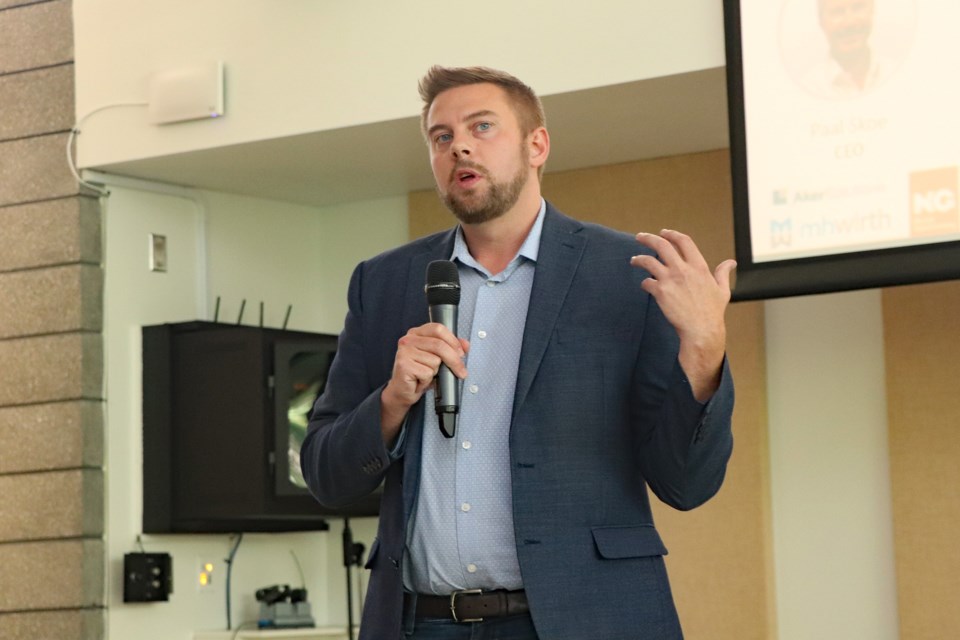INNISFAIL – Varme Energy has moved aggressively forward with its cutting-edge waste-to-energy technology for Innisfail by signing a joint working agreement with the Ermineskin-owned Neyaskweyahk Group of Companies.
The agreement could be a game changer for the company’s ambitious move into Alberta, specifically its intention to set up a $175 million plant in Innisfail that could generate energy from hundreds of thousands of tonnes of waste every year from landfills across the region.
The agreement between Edmonton-based Varme, a Canadian subsidiary of Norway-based Green Transition Holdings, and the Ermineskin Cree Nation was announced last month with an eye to collaborate to fund and construct the first waste-to-energy facility in Alberta, which could be in Innisfail.
“They're (Ermineskin) interested in being a project investor and partner across our portfolio of projects in Alberta,” said Sean Collins, Varme’s chief executive officer, whose company is also working with the City of Edmonton, and within Alberta’s Industrial Heartland to create waste-to-energy facilities.
“I think it's become sort of table stakes in Canada that if you want to have a well thought out energy project, meaningful engagement, participation and equity ownership from First Nations is critical. We’re thrilled to have a real partner in Ermineskin. They are walking with us side by side in this project.”
He also noted the Ermineskin Cree Nation is the largest shareholder of the First Nations Bank of Canada, a Schedule 1 bank that is a wholly domestic national institution mandated to take customer deposits and regulated by the Federal Bank Act.
“They bring a lot of capital sophistication, and they're very politically astute; very ambitious as a group,” said Collins. “We're very, very proud of this partnership.”
Collins declined to discuss “publicly specific financing details” of the agreement but did say the Ermineskin group is “interested in being a material equity” project investor, adding the group of companies has made several assets and investments over the years.
“A really strong balance sheet and a lot of dynamic engagement,” said Collins, adding the Ermineskin group has a committed “values alignment” for land protection projects, such as eliminating waste from ending up permanently in a landfill. “They feel there will be a number of other First Nations in Alberta that would be interested in having their waste attached to one of our projects.
“That will be one of the areas we collaborate with Ermineskin on, having them lead outreach to other First Nations across Alberta around contributing their waste either to one of the Edmonton projects or the Innisfail project.”
In a media release issued last month, the Ermineskin Cree Nation said it was eager to explore the opportunity to invest in leading-edge facilities that will create jobs, reduce emissions, generate energy, and shrink landfills.
“Our nation is focused on building a strong and vibrant economy that will support our families for generations to come,” said Maureen Ward, chief executive officer for the Neyaskweyahk Group of Companies, in the media release. “We’re looking forward to working in partnership with Varme Energy to identify investment opportunities that support bringing waste-to-energy technology to Canada at scale.”
Collins and other Varme Energy officials were in Innisfail last August to pitch their planned project to Innisfailians at a well attended town hall meeting.
He confirmed that financing could be secured by the second or third quarter next year to clear the way for construction for the company’s first waste-to-energy facility in Alberta, either in Edmonton or Innisfail. However, he added securing long-term waste contracts is still the biggest hurdle in moving forward.
Since last summer’s Innisfail pitch, they have contacted other Central Alberta communities and groups, including the Mountain View Regional Waste Management Commission which has a landfill near Didsbury, to gauge the level of interest of seeing a waste-to-energy facility in the region.
Collins said his company has submitted requests for letters of intent from Rocky Mountain House and Blackfalds to see if those communities will commit their waste to the Varme project.
The company has signed a letter of intent with the Town of Innisfail that “signals intent” to sign a final agreement; one that remains contingent on Varme securing waste-to-energy contracts outside the community.
The plan calls for a new state-of-the-art plant on 13 acres of land in the town’s new Southwest Industrial Park. The facility, which would take about two and half years to build and employ up to 125 construction workers, would employ about 30 full-time jobs.
Collins said with interest ramping up for his company’s cutting-edge waste-to-energy technology he is increasingly hopeful Innisfail will have a state-of-the-art plant sooner rather than later.
“Absolutely. I would say as optimistic, if not more optimistic,” said Collins.



